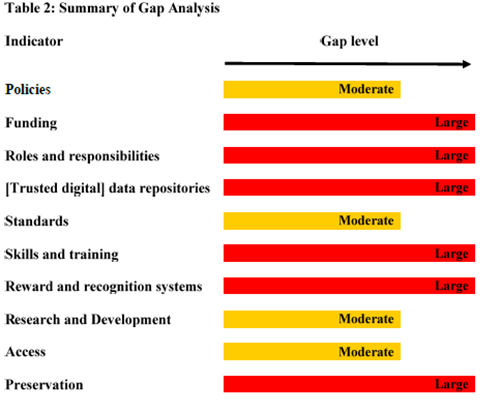Via Pam Bjornson, Chair, Research Data Strategy Working Group, I learn of a report from Research Data Canada: Stewardship of research data in Canada: a gap analysis [pdf].
The method is interesting:
This report provides a statement of the ideal state of research data stewardship in Canada and a description of the current state, as determined by examining a number of indicators. The purpose is to provide evidence of gaps between current and ideal state in order to begin filling in the gaps. The indicators of the state of the stewardship of research data in Canada are as follows: policies; funding; roles and responsibilities; [trusted digital] data repositories; standards; skills and training; reward and recognition systems; research and development; accessibility; and preservation. [Key Achievements – Research Data Canada]
It is no surprise that they find evidence of significant gaps: looking towards an ‘ideal state’ raises a high bar 😉 Here is a schematic:

Although they point to activities in other countries as evidence that Canada is behind, I imagine that national policy, funding and service infrastructure in few countries is really very advanced.
There has been some discussion about the role of research libraries in relation to data curation. This touches on general questions about institutional roles, in the context of disciplinary and regional or national provision. However, it also raises interesting questions about the future position of libraries in relation to institutional materials. As digital information management begins to pervade research and learning activity, so do information processing and data management activities, which puts the library into a potentially new relationship with faculty and other service departments. So far, much of this interaction has focused on the institutional repository. The role of the library in the broader context of managing institutional intellectual assets (research data, learning materials, business records/archives, video and sound recordings of university events, …) is one that universities – and libraries – will have to grapple with in coming years.



